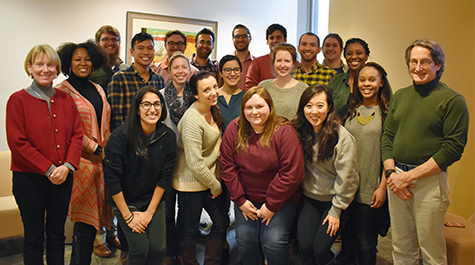Research sheds light on what brings families back for counseling
Families are more likely to stick with family counseling if they feel hopeful and confident that their counselor can help them after their first session, according to research conducted at the New Horizons Family Counseling Clinic at the William & Mary School of Education. The team of researchers, led by counseling professors Charles “Rip” McAdams and Victoria Foster, co-directors of the clinic, has also developed a six-module training program based on the new data about why families return to counseling.
Families who come back to family therapy after just one session are most likely to do so if their counselor is professional, competent, and capable of inspiring hope that the family’s difficulties can be addressed. These are three of six factors identified by William & Mary researchers as important to families who seek family therapy – they also found that families are more likely to return for counseling if they feel their therapist genuinely cares and wants to help, was able to explain the counseling process, and created a therapeutic environment that felt safe to the families.
These results, drawn from surveys completed by 87 families seeking care at New Horizons, were published in a 2015 issue of the Journal of Family Psychotherapy. They constitute the first research effort to try to understand what therapists can do to encourage families to return for a second session, and have led to the development of training modules that can enhance family therapists’ first sessions. A more detailed examination of what therapists can do in that first session appears as a research review in a 2018 issue of the Journal of Family Psychotherapy.
Family therapists believe in the importance of family counseling – and they have the data to support the effectiveness of family therapy to address a range of issues including eating disorders, ADHD, conduct problems, substance abuse, and parenting challenges broadly defined. But families are likely not swayed by this data – more than half of families who seek family therapy drop out after the first session.
“More people drop out of family counseling than individual counseling,” explains McAdams. Families drop out for many reasons, including the facts that people may not always understand the value of family counseling, the logistics around bringing multiple family members to a therapy session at a set time, and the reality that the decision to bring a family to counseling can hinge on the desire of just one family member.
The good news from this research is that therapists can do a lot to bring families back for subsequent sessions, said McAdams. “We have found that there are aspects of the counselor that have a bearing on why people come back.”
Reducing fear and confusion about the counseling process is particularly important, according to co-author and family counselor Rebecca Sheffield M.Ed. ’11, Ph.D. ‘17, the clinical director of New Horizons and adjunct faculty member at William & Mary.
“If we can reduce the fear and anxious feelings about counseling, that is very helpful,” said Sheffield. “We want our clients to know we’ve got this, and we want to create an atmosphere that is welcoming to all families.”
McAdams, Foster, Sheffield, and a team of doctoral counseling students dug more deeply into the six factors the families identified to create training modules that can be used in counselor education. Their research led to the most recent publication on the topic.
“There’s a lot we still don’t know, but what we do know is that the factors that bring families back in are possible for any therapist to incorporate. Specifically for counselors in training, our research should be welcome news. You don’t have to have had years of experience as a therapist to have a first session that will encourage a family to return,” explained Foster, a co-author of both studies.
The cost of therapy is a concern for many families, but “family therapy seems to be cost-effective, evidence-based, and sometimes takes less time than seeing people individually,” said Sheffield. Therapy provided to families in eight county school systems surrounding Williamsburg through New Horizons (both on campus and at satellite locations) is free of charge. In many cases, structural family therapy (the model used at the clinic) is also more cost-effective than other possible outcomes. For example, investing family time in structural family therapy may prevent significant costs later on in the form of paying for substance abuse treatment, divorce and custody disputes, and other potential long-term outcomes.
Families may self-refer for therapy at the New Horizons Family Counseling Center through the website or seek a referral through their child’s school counselor.
